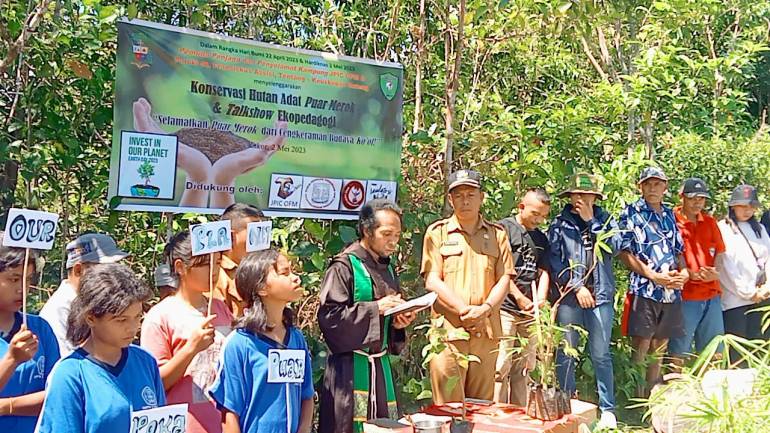Concerned about ecological crisis, Catholic youth hold forest conservation action

Catholic environmentalist youths held a conservation action and talk show titled Eco Pedagogy to express their concern for the ecological crisis of the Merok forest on May 2 in Kakor, Golo Keli Village, West Manggarai Regency, Flores, Indonesia.
One hundred fifty people from various sectors of society, including the local government, the priests of St. Francis Assisi Tentang, traditional village leaders, parishioners, teachers, students, and Kakor residents, participated in the event, which was held in conjunction with the momentum of Indonesia's National Education Day.
Organized by members of the Village Rescue Preservation Youth Community (P3K), the activities included ecological liturgy, a talk show, and planting 200 bamboo, aur, betong, and sengon saplings.
Father Andre Bisa, the parish priest of St. Francis of Assisi Tentang, explained that "the concept of Eco pedagogy,” preceded by the commemoration of Earth Day, requires genuine efforts from the educators and educational participants “to rethink, re-structure, and re-distribute their daily lifestyles that are in harmony with nature or commensurate with local wisdom."
He said, "The virtue of Eco pedagogy wants to show that education is always closely related to space and time, where the relationship between humans and the natural environment has a real place."
Citing Richard Khan's Critical Pedagogy, Ecoliteracy, and Planetary Crisis, Father Andre said that humans who are homo sapiens realize themselves as homo ecologicus and continue to transform themselves through education as homo educans.
"Through a frame of mind like this, ecological education is urgently needed to hone ecological sensibility and continuous awareness of the existence of the environment as part of an ecosystem that influences human life," said the priest.
He further elaborated that through ecological education, everyone is led to an environmental sensibility that is always aware that his existence can only be meaningful if he exists with other creatures.
As the head of the Ndoso sub-district, Anselmus Darman commended the youth group’s activity for selecting an environmental protection organization and urged collaboration through sustainable networks or synergies to control the management of the Merok Forest customary forest.
"We all know that this conserved forest is customary, so in the future, there needs to be synergy, discussion, dialogue, or activities involving more and more people, both the government, traditional leaders, religious leaders, and community members, so that it remains sustainable," he said.

Meanwhile, one of the Catholic youths, Lian Kurniawan, the chief executive of the activity, emphasized that "the activity being held was based on a deep concern for the damage to the Merok forest customary forest ecosystem due to illegal logging by residents to take forest products in the form of wood to meet the need for firewood."
Benediktus Jebabun, Head of the youth group, said that "education that every individual in daily life carries out is interacting with nature, recognizing nature, exploring nature, working to obtain results from nature, taking sustenance from nature, and finally learning from nature regarding how nature gives life to all living things."
Today's conservation activity is an opportunity to learn about the environment from the perspective of Manggarai's local wisdom, such as interpreting forests, land, water, and the environment," he said.
Merok Forest included Indonesia's forest area of 125.82 million hectares in 2020. In detail, 29.58 million hectares of Indonesia's forests are protected forest areas. Then, 27.41 million hectares are protected areas and nature conservation areas.
Of this total, the country is one of the top five nations worldwide that has lost large forest areas over the last two decades. According to data from Global Forest Watch, it lost 9.75 million hectares of primary forest between 2002 and 2020.-Kasmir Nema
Radio Veritas Asia (RVA), a media platform of the Catholic Church, aims to share Christ. RVA started in 1969 as a continental Catholic radio station to serve Asian countries in their respective local language, thus earning the tag “the Voice of Asian Christianity.” Responding to the emerging context, RVA embraced media platforms to connect with the global Asian audience via its 21 language websites and various social media platforms.














